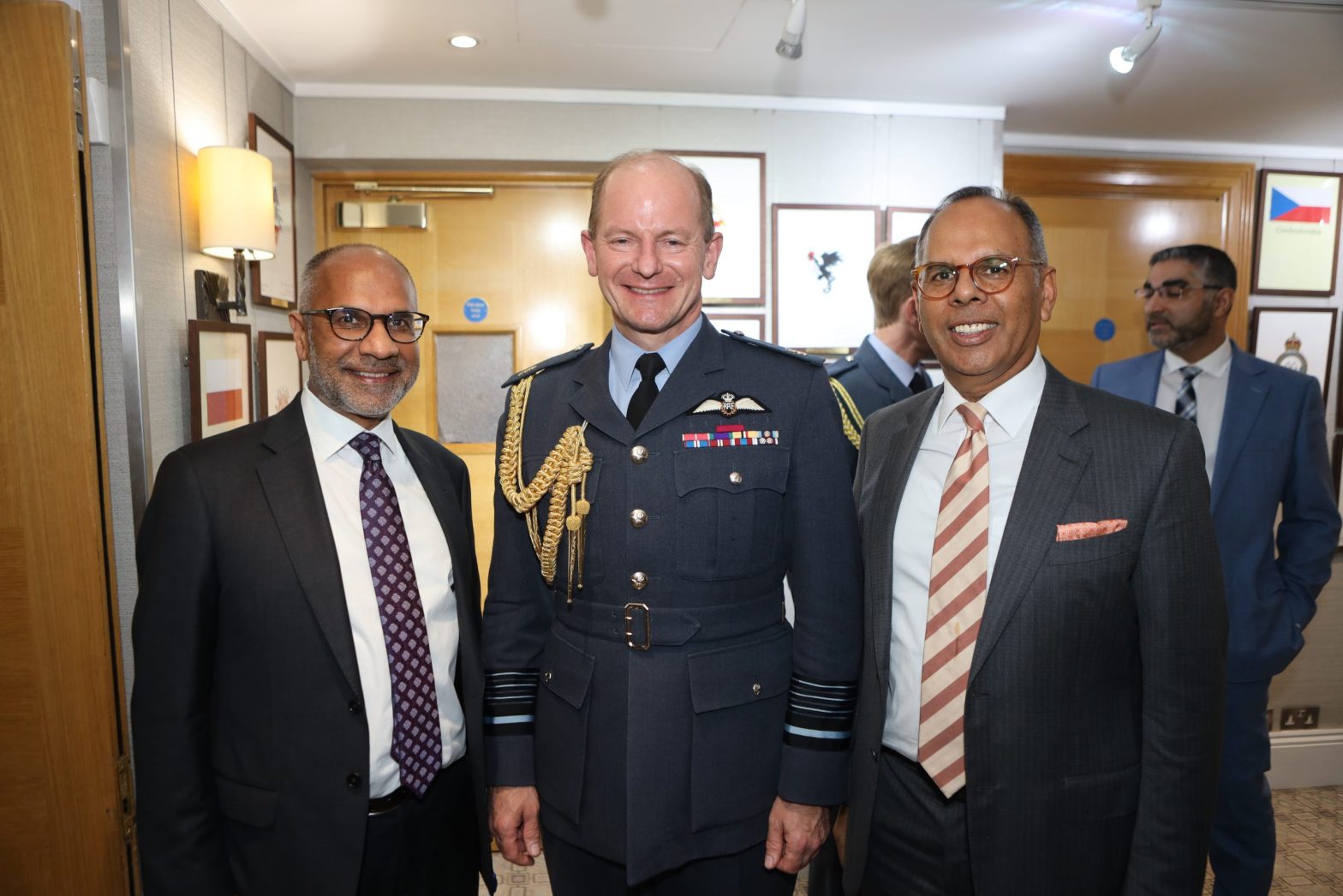
The head of the Royal Air Force (RAF), Air Chief Marshal Sir Mike Wigston, has said increased diversity in the armed forces is “mission critical” in future battles as he vowed to attract the “brightest and best of every single community”.
Currently, 2.1 per cent of all RAF service personnel identify according to census categories as BAME – of a recorded force of 32,960 personnel, 770 are from non-white backgrounds.
The RAF aims to increase the proportion of ethnic minority recruits to 20 per cent and female recruits to 40 per cent by 2040 – goals that are more ambitious than the Army or Royal Navy.
“The evidence is clear – that more diverse teams are more effective and more agile and more innovative, and they make better decisions,” Sir Mike said at an event hosted by the Asian Media Group (AMG), publishers of Eastern Eye and Garavi Gujarat newsweeklies in London last Wednesday (10).
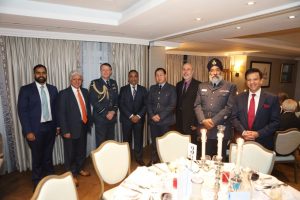
Research proved that having a diverse workforce was a positive for organisations, the head of the RAF noted.
Sir Mike said, “It is mission critical in the future battlespace, but it’s also business critical, because I look at the figures of how the demographics of the United Kingdom are changing. By 2030, 25 per cent of 17 to 25 year olds – the key cohort we recruit from – will be from non-white backgrounds. And of course, of that remaining 75 per cent, half of them are women.”
A number of influential British Asians from business, politics, academia and community leaders attended the event at the RAF Club in Piccadilly.
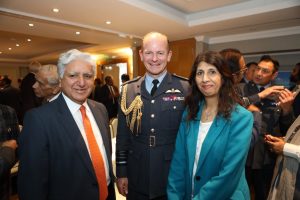
Entrepreneur Dinesh Dhamija; Bestway managing director Dawood Pervez; president of the Zoroastrian Funds of Europe, Malcolm Deboo; regional head of State Bank of India, Sudhir Sharma; former chair of the British Medical Association, Dr Chaand Nagpaul; external member of the Bank of England’s Monetary Policy Committee, Swati Dhingra and leader of Brent Council, Muhammed Butt, were among those who attended.
Sir Mike told the gathering, “I’ve got 1,500 pilots in the Royal Air Force, fewer than 10 are from ethnic minorities, 30 are women. Out of 8,500 engineers, two per cent are from ethnic minorities. That’s two per cent today, against 25 per cent of the population in just seven years’ time. Six per cent of my engineers are women.
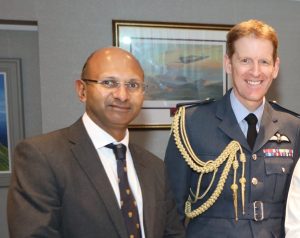
“We’ve got a long way to go and that’s why I’ve been absolutely determined that the Royal Air Force does change. I have driven that from the very top of the organisation, because there’s no doubt in my mind that the challenge for us as an as an organisation, to succeed in the future, depends on us being able to attract people from every single part of the UK population.
“This is something that I and my leadership team are absolutely determined to do.”
He added, “The RAF is an exciting and fulfilling place to work. The ability to serve our country is something we are all inspired by and proud to do.
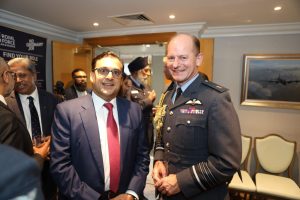
“I would like our guests to speak to some of the people who are serving – not just my generation, but also the younger generation, who are here and hear what it’s like to be in the Royal Air Force today.
“Here the changes we’re trying to make and hear about that what it means to wear this uniform, to serve our country, to protect our skies and space, to be take part of amazing ceremonial events like the coronation on Saturday (6).
“When you go back to your communities, your families and friends, please spread the word. Open people’s minds, in every community, to the opportunities that the Royal Air Force offers.”
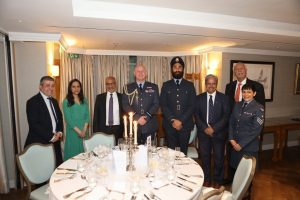
There are a variety of roles individuals can take on within the RAF. They range from pilots and navigators to engineers and support personnel. Each role is critical to the functioning and success of the RAF, and those who take on these roles are trained.
Sir Mike said, “I really want the Royal Air Force to be an attractive, professional destination for the brightest and best of every single community. And I can’t say that hand on heart that we are today, but that’s where that’s where we’ve got to go.
“Five years ago, we celebrated our first 100 years. In my role as chief of the air staff, it’s to make sure we are set ready and fighting fit for the next 100 years and that means change.
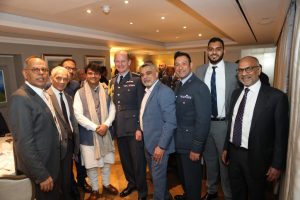
“Some of the habits we’ve got into, some of the approaches we’ve taken to our workforce to some of the ways we operated in the air – they needed to change, and first and foremost in that was the was the demographics of our organisation.”
The AMG group managing editor Kalpesh Solanki, paid tribute to Sir Mike, who leaves his post next month.
He said, “Sir Mike became head of the RAF in July 2019 and since that time, he has put equality and diversity firmly at the top of his agenda. He is genuinely passionate about diversity and has perhaps done more than any other service chief in making the RAF a more inclusive and welcoming organisation for ethnic minorities.”
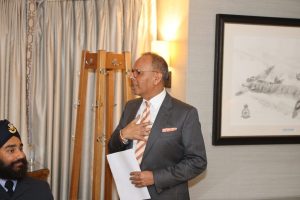
Solanki added that King Charles’s coronation ceremony showed the best of British society and how every organisation needs to represent the unique cultural make-up of the nation.
“The coronation managed to delicately balance tradition dating back 1,000 years with a ceremony reflecting a modern multifaith Britain,” he said. “It was a genuinely poignant moment when our first British Asian prime minister, a practising Hindu, read a passage from the Bible with heartfelt purpose and eloquence.
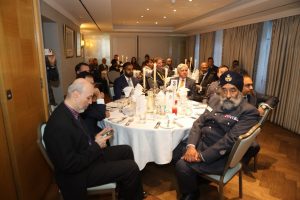
“Peers from various faiths handed the King symbols of the instruments of state to emphasise the strength of our diversity and that we all belong in a modern multi-faith Britain.
“An equal and fair society is a fundamental part of any civilised democracy and only when all of our citizens can rise to the best of their talents can we be at our best.”
‘I was looking for adventure’
JASPAL SIDHU left a career as a technical engineer at Boeing to join the Royal Air Force (RAF) because he was looking for “adventure.”
“I was in my early 20s, commuting back and forth to work every day. I wanted something different, a sense of adventure in my life and I chose the RAF. I don’t think I can look back and think I made the wrong choice. It’s worked out really well,” said Sidhu.
“The initial officer training was very much an adventure in and of itself. You do various military leadership exercises – like leading a platoon or defending an airfield. You go on adventure training classes, such as mountain biking in Scotland, rock climbing in Wales. It’s been quite varied on that front.
“I’ve also been in the ministry of defence main building for six months. That was really interesting – seeing all three armed forces, seeing everything as they unfolded in real time. That was very much an adventure in itself.”
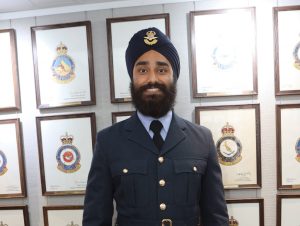
The 27-year-old air systems officer said he realised early on that the RAF strived to be an inclusive and diverse organisation.
“I was about two months into training when the head of the Royal Air Force visited my local Sikh temple, the gurdwara. That was interesting to see – he had a genuine respect and interest in cultural heritage. And he’s quite knowledgeable on Sikhs in the military.
“As an officer cadet going through training, it gave me the idea that leadership is considering us and is looking after us.
“The chief of staff made a really good speech today as well.
“It’s very much being pushed by leadership and it’s something that we all welcome, being in the RAF.”
‘I knew i would keep learning’
MANVEET DHALIWAL, a junior engineering officer at the Royal Air Force (RAF), told Eastern Eye how her mum got her interested in the organisation. “My mum was the one who initially spoke to the RAF recruiter and then she spoke to me about it. I was really well supported when going through the process,” said Dhaliwal.
“I was sponsored by the RAF during my time at university as well. That was largely down to my mum for having had that knowledge to go into the recruiter and speak to them about it. “Having the backing of parents makes a massive difference in whatever you want to do in life.”
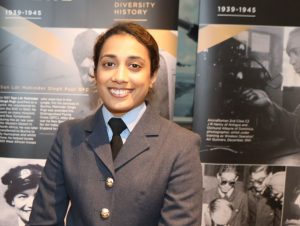
Dhaliwal was sponsored to pursue a master’s in aeronautical engineering on the basis of giving three years’ service to the RAF after completing the course.
She was “more than happy” to work three years for the RAF, she said, adding the lifestyle as an RAF officer is what initially attracted her to the organisation.
“I always wanted to do engineering. It didn’t really make a huge difference for me – working in industry or making decisions for the RAF.
“But the RAF had the added benefits of the lifestyle, I didn’t have to change myself to work in the Royal Air Force. The RAF fit around my life and how I wanted it to be.
“I like the flexibility within my role. I get to change roles and I get to experience all aspects of the RAF as an engineer. That’s what attracted me to it; I knew I wouldn’t be in one place for too long. It meant I could continue to stay fresh, keep learning and hopefully make a positive impact.”
Dhaliwal, 27, said she felt comfortable as a young Asian woman working in the RAF and added the organisation was continually trying to improve on inclusion. “There’s been a real increase in the number of networks and events within the RAF. the good work they’re doing might not always be externally seen, but internally it’s really well-received,” she said.
‘No conflict of faith and service’
MARYAM AKRAM is a hijab-wearing woman of mixed Jamaican and Pakistani heritage. She told Eastern Eye she was welcomed “gracefully” by the RAF.“The RAF has welcomed me as a Muslim woman, as a mixed-race woman. With every unit I camp I’ve been to, I’ve been to be welcomed gracefully,” said Akram, who has been with the RAF for four years.
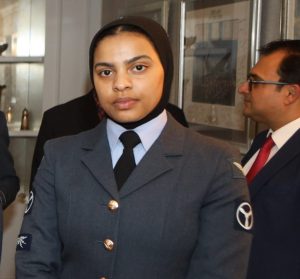
“However, of course, there may be certain individuals who may not understand your faith or culture. That could simply be solved with a general conversation as well. As people open up to the idea that you are a Muslim woman and one of colour and have a simple conversation, it breaks down barriers and misconceptions.”
Akram gave the recent example of Ramadan as a way the RAF is an inclusive organisation.
“Ramadan is a widely practised event in the RAF. There is a specific guide and policy for RAF officers practising Ramadan. There isn’t a conflict of faith and service – they complement each other in the RAF.”